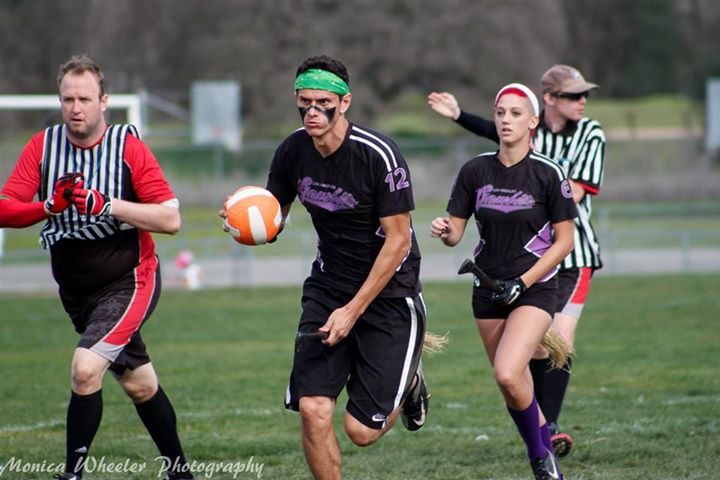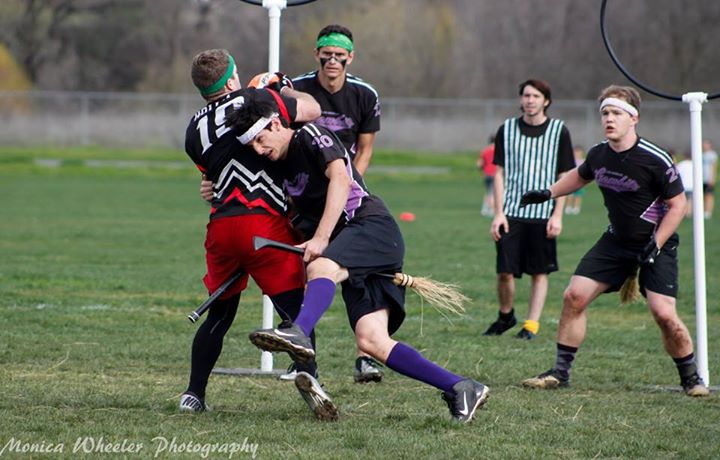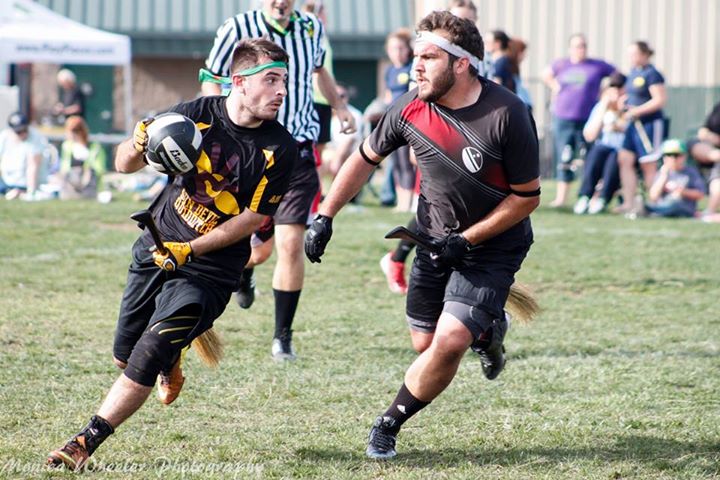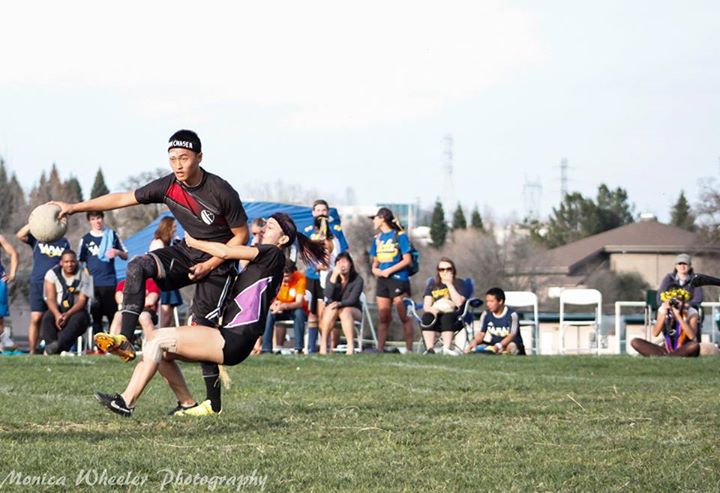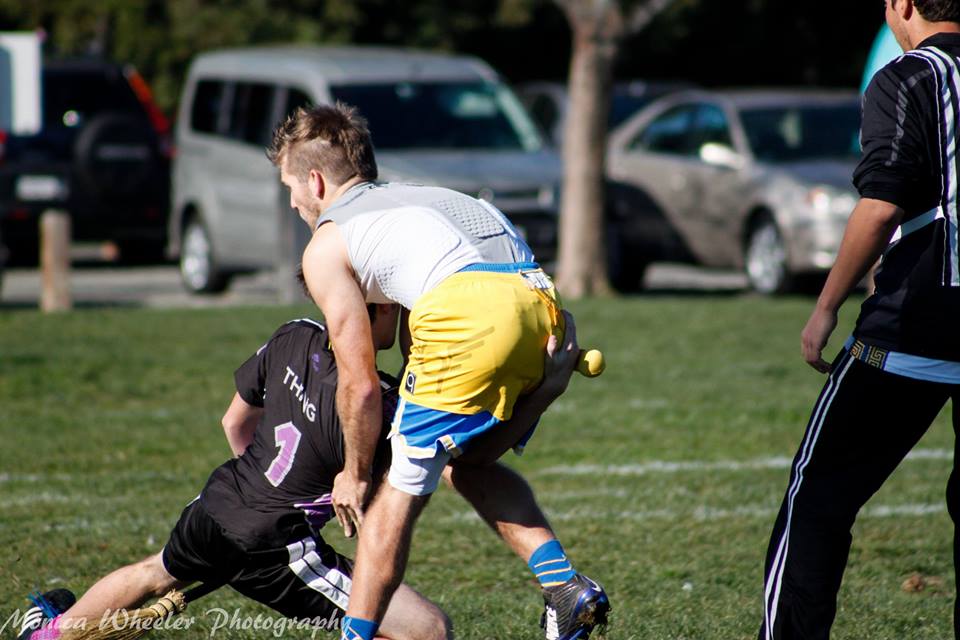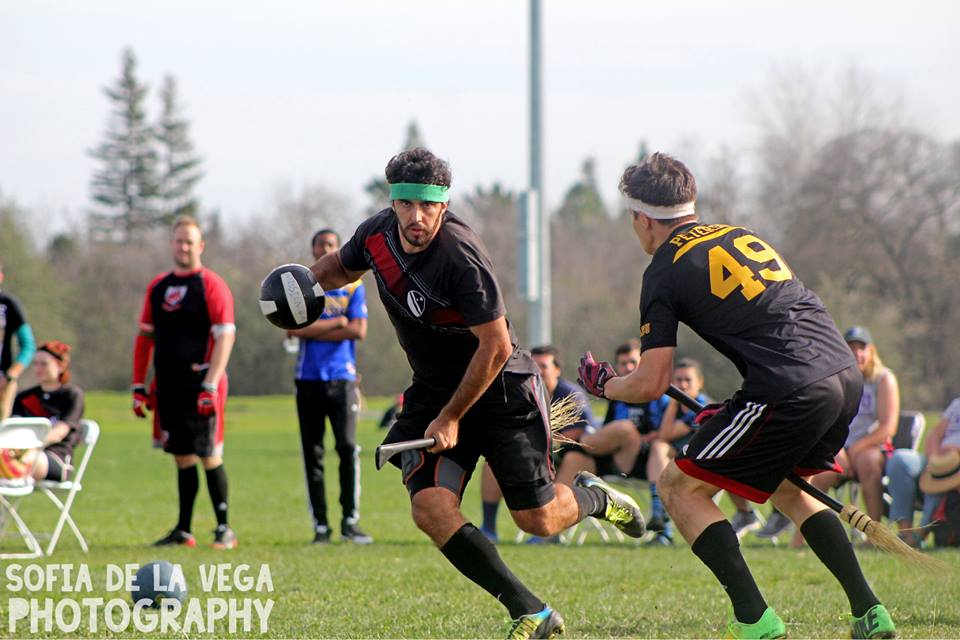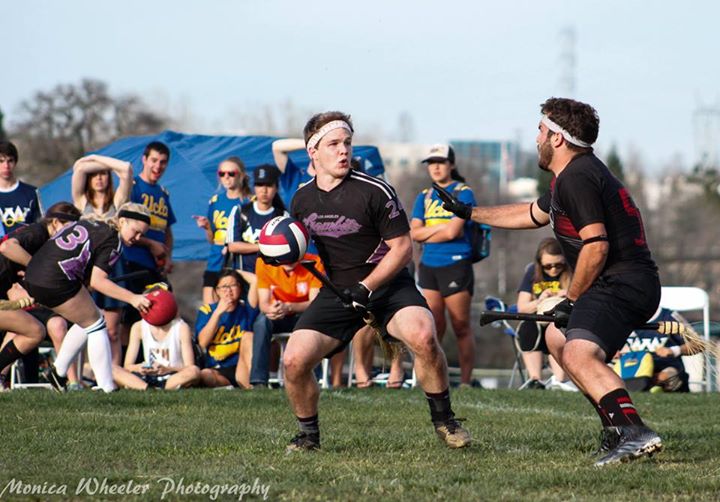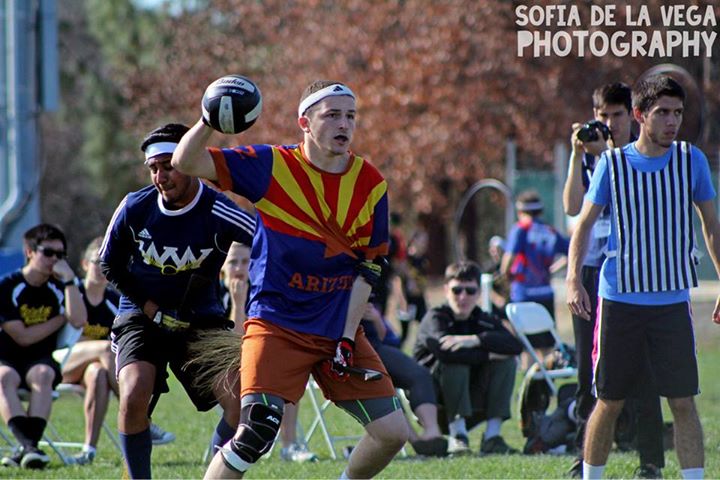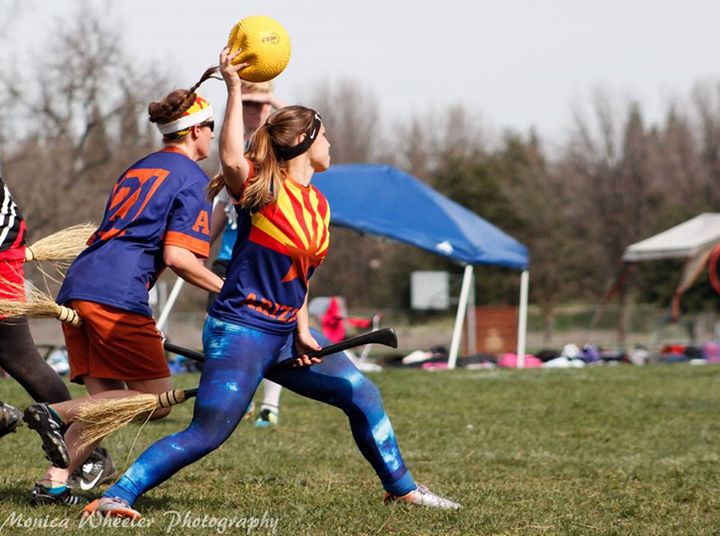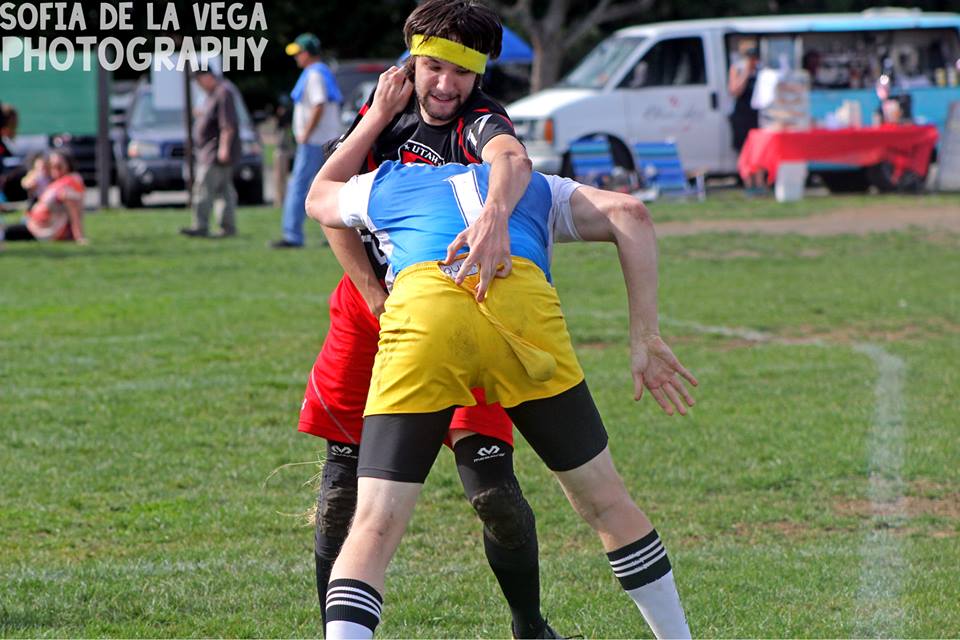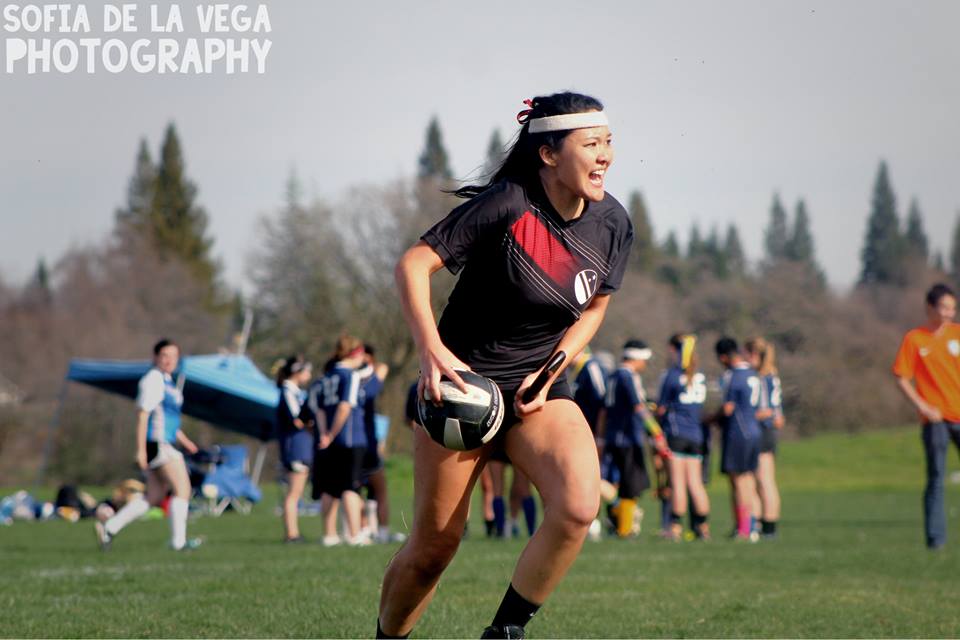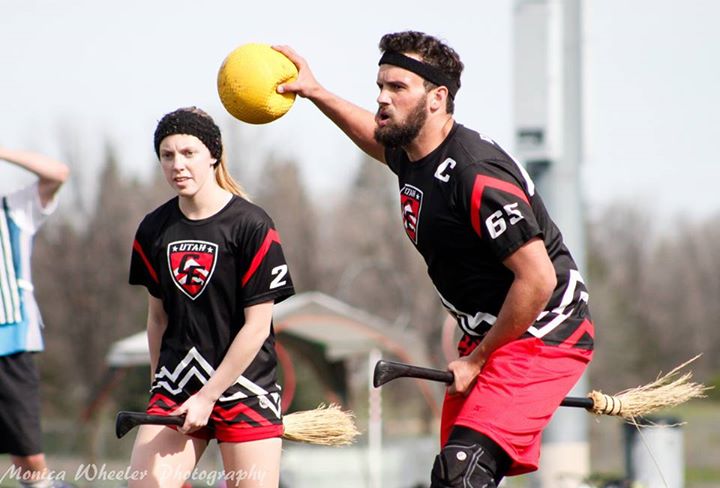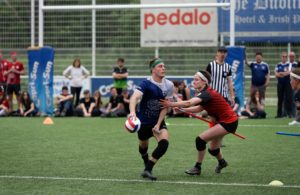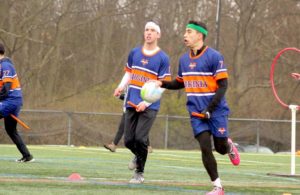- Rule, Britannia, no more?
- Unpopular Opinions: US Quadball Cup 2023
- Proven Contenders: University of Virginia
- Proven Contenders: Rutgers University
- Proven Contenders: University of Michigan
- Proven Contenders: Creighton University
- Different Perspectives: A Look Inside USA Ultimate
- Antwerp QC, Much of Belgian Core, Leaves Competitive Quidditch
West Regional Championship All-Tournament Team
- By Dan Hanson
- Updated: February 27, 2015
Correspondents Kevin Oelze and Dan Hanson compiled the top performers from the West Regional Championship to create an Eighth Man All-Tournament Team.
| First Team | Second Team | Third Team | |
| K | MVP: Tony Rodriguez (LAG) | Alex Browne (LBQC) | Ben Harding (SBB) |
| C | Ren Bettendorf (LAG) | Andrew Murray (LAG) | Alex Makk (Skrewts) |
| C | Jake Tieman (LBQC) | Lucy Miller (Skrewts) | George Williams (Utah St.) |
| C | Kristin Jakus (Utah) | Nate Cortazzo (AZQC) | Tiffany Chow (LBQC) |
| B | Peter Lee (LBQC) | Ryan McGonagle (ASU) | Ben Reuling (Utah) |
| B | Alyssa Burton (LAG) | Amanda Nagy (AZQC) | Kyrie Timbrook (Skrewts) |
| S/U | Alex Richardson (LAG) | Dan Howland (Utah) | Missy Sponagle (LBQC) |
FIRST TEAM
Keeper: Tony Rodriguez, LA Gambits
Tony Rodriguez and Lost Boys Quidditch Club keeper Alex Browne have become the Tom Brady and Peyton Manning of the West, but it is not yet clear who is who. In this tournament, Rodriguez finally outplayed Browne on the biggest stage the two have gone head to head on thus far.
There were a few notable plays in the championship match in between the two keepers exchanging dunks on one another. Rodriguez sunk a shot on the top of the top hoop, Browne’s Achilles’ heel in terms of defending against his former teammate. The most symbolic moment came early in the game when Browne got within a few feet of the hoop on a drive and Rodriguez was able to wrestle the ball out and come up with it in his keeper zone. By the time that game was done, Rodriguez was also able to wrestle the title of best team and best player in the West out of Browne’s hands. Though no official award was given at the tournament, The Eighth Man awards Tony Rodriguez the title of West Regional Championship MVP.
Chaser – Ren Bettendorf, LA Gambits
Ren Bettendorf didn’t have his best tournament, yet he still came out the top chaser of the weekend. Like the rest of his teammates, Bettendorf really delivered in the final, but that doesn’t mean his entire tournament performance wasn’t loaded with goals, assists and–most importantly– stellar defense. Bettendorf is the best defensive chaser in the West, with an insane reach he uses well to intercept passes. He also has the confidence and skill to make open-field tackles against anyone. I could go on and on, but it’s just that simple: Bettendorf is the complete package.
Chaser – Jake Tieman, Lost Boys Quidditch Club
Jake Tieman is the perfect embodiment of a high-risk, high-reward player. Our colleague Ethan Sturm was quick to point out his flaws, but with a player like Tieman, the results of his efforts far outweigh those flaws.
The Gambits came hard and fast out of the gate against the Lost Boys, but Tieman was extremely involved, keeping right on his rivals’ heels until that fateful red card took him out of the game. Tieman has actually decreased the number of cards he draws as he has become more valuable to his team, and I expect that pattern to continue for the rest of the season. He is at his most effective offensively with the snitch on pitch, and a defenseless receiver red card made it so that we may never know what could have been if Tieman had remained in the game against the Gambits.
What we do know, however, is that Tieman was stingy on defense and as unstoppable as ever on offense. The only player in the West who has proven to be able to stop him? The chaser on the list above him: Bettendorf. Tieman is adding sharper passing skills to his game and racking up the occasional assist. He adds an irreplaceable dynamic to the Lost Boys that makes him worthy of the first line on this Eighth Man All-Tournament Team.
Chaser – Kristin Jakus, Utah Crimson Elite
Who? No, no, Missy Sponagle has not been supplanted as the region’s best female chaser, but we are going to argue that Kristin Jakus was the most valuable female chaser to her team at this tournament. She dives on the ball on defense, she completes open alley-oop dunks, plays pesky man defense and does all the things players in her role need to do well.
However, Jakus brings a unique skill set to the table that made her the No. 1 female chaser of the weekend. She finishes through physical defense better than any other female chaser at the tournament (except Sponagle, but we’ll get to her later). Jakus takes plays that should be dead behind her opponents hoops and not only keeps them alive with a smart reset, but knows when she can turn those plays into goals. She dunks with style, makes defenders look silly and turns chaos in the backfield into assists. Add her excellent offense to the best defense she has ever played, and it is hard to argue against her for first-team honors.
Beater – Peter Lee, Lost Boys Quidditch Club
Peter Lee and teammate Chris Seto are often overly separated when credit is given for the Lost Boys phenomenal beating game, but Lee gets the first-team honors this time around for his absolutely incredible playmaking ability. If you can process what Lee is able to do on this play fast enough, it is mind blowing:
At 29 minutes, Arizona State University has bludger control. Moments before, Lee casually beats the seeker and collects the rebound. He then moves toward the point defender, giving Lost Boys keeper Jeff Lin space to advance. Instead of beating the point defender, Lee beats Arizona State beater Julea Shaw. This attracts the attention of the other opposing beater, Josh Mattison, who takes his focus away from the quaffle to take care of Lee. This would be enough to create time for the Lost Boys to attack and score on what was a drive against bludger control, but Lee gets a bonus bludger in his hands when he makes a freak diving catch on Mattison’s bludger.
And it gets better! Mattison is like, “Well that sucks, but at least I can get one of these bludgers on the ground back to my hoops.” No! Lee beats him before he can recover a single bludger. Lee’s beating partner, Sarah Ballister, returns a bludger to the Lost Boys side. Lin scores from short range. Lee returns with a second bludger. A goal and control recovered in the most striking example of the kinds of plays Lee was making all weekend.
Beater – Alyssa Burton, LA Gambits
The biggest difference between this game and the previous game between the Lost Boys and Gambits was the Lost Boys beaters were unable to completely control the pitch. At LA Open, it felt like the Gambits chasers had no room to move and were being suffocated out of the game. This wasn’t at all the case in the regional final, and while we saw strong efforts from the Gambits male beaters, Alyssa Burton was a rock for this team all weekend. She was stalwart in holding onto bludger control, making some key catches in cross-beat exchanges in the finals to ensure that the Gambits beaters held their own against an extremely-strong Lost Boys side. Burton is the complete package–she can throw, catch, take and give hits and play intelligently, and she is typically ranked among the best female beaters in a region full of strong ones. At the West Regional Championship, however, she was the best.
Seeker – Alex Richardson, LA Gambits
How can a seeker with zero SWIM catches be the first-team seeker? Well, Alex Richardson was just that good. This season, he has established himself as the best seeker in the West. Small seekers like him have seen declining success over the years, but Richardson has only continued to improve. He is the perfect mix of aggression, intelligence and surprising strength. While he didn’t get to make the biggest catch of the tournament, he set the stage as much as any seeker ever has. Look at the final game times for each of the Gambits’ Sunday games leading up to the final:
Round of 16: Gambits 120* – 50 USC (18:12)
Quarterfinal: Gambits 130* – 40 Silicon Valley Skrewts (18:22)
Semifinal: Gambits 120* – 40 Crimson Elite (18:45)
Not only are those consistently remarkable times, but those are all catches in situations where the opposing seekers were attempting to block. On the other side of the bracket, the Lost Boys played a 30-minute semifinal. The Gambits had played far fewer minutes on Sunday than their championship opponent, and that might have made a significant difference in a game separated by only 30 quaffle points.
Not to mention, the quality of Richardson’s catches outclassed every seeker by far. In his final snitch catch to seal the Gambits’ trip to the final, snitch Brian Vampola was throwing Richardson to the ground. Richardson dove between his legs, reached up and managed to grab the snitch from below. Zero SWIM catches? Six for six total in seven games. Richardson is the best in the West.
SECOND TEAM
Keeper – Alex Browne, Lost Boys Quidditch Club
For most of the year, Browne has looked like the best player in the West as the Lost Boys plowed through the first half of the season and the first six games of the West Regional. Unfortunately for them, he was upstaged in the final by Rodriguez, but that doesn’t mean that Browne wasn’t in great form. Coming back from cutting open his chin in the semifinals, Browne pioneered new quidditch fashion with huge red and purple bandages under his green headband. He kept his team in snitch range in the final and was an unstoppable force throughout the rest of the tournament, as his team was never seriously threatened in any other game. Browne is an awesomely unique mix of agility and strength, which makes him a threat in all aspects of the game: passing, receiving, driving, tackling and shot blocking. If those were the qualities that made up quidditch’s version of five-tool players, we would put Browne at or near the top of that list.
Chaser – Andrew Murray, LA Gambits
The story of this tournament was the dominant quaffle play of the Gambits, and Andrew Murray is the third member of the Gambits’ three-headed monster (along with Rodriguez and Bettendorf). Murray is a fierce point defender and works phenomenally off-ball with Rodriguez, finishing drives with a fantastic short-range shooting game. Murray was a workhorse all weekend, and their offense and defense would suffer without him. He was a big part of the Gambits’ improved chaser chemistry that helped them win the final. One of his most unique characteristics this season has been his bludger dodging. He makes the flashiest dodges of any player, and beaters in the West do not seem to have figured that out. He dives to the ground with incredible speed and bludger after bludger sails right over him. That quality pales in comparison to Murray’s intelligence and strength on both sides of the ball. Like Bettendorf, Murray is the complete package.
Chaser – Nate Cortazzo, Arizona Quidditch Club
The bulk of Arizona Quidditch Club’s talent lies among its male quaffle players. Though the team had a small roster in terms of its huddle at the West Regional, there was certainly nothing small about its chaser line. They each bring unique and important skills to the table, but Nate Cortazzo stands out. He is a black hole on defense, sucking in opposing ball carriers with excellent form tackles. He is that player who lays down the big hit that fuels the energy of the whole team. Cortazzo also provides a strong scoring presence and, as the cherry on top, caught the snitch that qualified AZQC for World Cup 8 in its first year.
Chaser – Lucy Miller, Silicon Valley Skrewts
The Skrewts have struggled for nearly their entire existence as a program when it comes to putting together a passing offense, but Lucy Miller is the final piece that brings the offense to the top of its game. They have great drivers like Kevin Oelze. They have great shooters like Andrew Covel. They have Alex Makk, who is a bit of both. But it easy to stop an offense that cannot pass. Miller has emerged as a huge playmaker for the Skrewts, positioning herself intelligently and finishing strong at the hoops to add that necessary dynamic to the Skrewts offense.
Beater – Ryan McGonagle, Arizona State University
It was tough finishing this list with only one Arizona State player, but Ryan McGonagle made the cut. The list’s newest player and only rookie, McGonagle was an unknown name roughly two months ago when he helped his team win Snow Cup, and he has been making a bigger and bigger name for himself at every tournament since then. His signature aggression and quickness was the main driver of Arizona State’s impressive and surprising semifinal run. McGonagle outplayed or held in check such veterans as Ryan Donahue, Ben Reuling, Cy Torrey and Vampola until he ran into Seto and Lee in the semifinals. McGonagle’s quickness and aggression made him a tough matchup for any beater, and he even looked good against Lee. However, Seto still has the experience and speed advantage over McGonagle and won the matchup. McGonagle’s role as the most vital piece in Arizona State’s young program gives him the nod for this list. He and Arizona State have an exciting future ahead.
Beater – Amanda Nagy, Arizona Quidditch Club
Amanda “Turtles” Nagy can be found making plays for her team more than she can be found talking, which you know is saying quite a lot if you have at any point in your life stood within earshot of her. She rarely needs a substitute and acts as the anchor of AZQC’s defense, which is by far the team’s most important half. On a team that rarely has the chance to practice together, Turtles uses surprisingly mature on-pitch leadership combined with great instincts to be one of the biggest reasons this team clicks when it clicks.
Seeker – Dan Howland, Utah Crimson Elite
Dan Howland made a name for himself as the most clutch seeker of the tournament. Crimson Elite’s strategy is heavily dependent on keeping teams close and relying on its seeker, and Howland delivered on his end. He used his comically long and active arms to pluck some of the biggest wins in the program’s history: A 130*-90 upset of UCLA to open the tournament, a 70*-50 quarterfinal win over AZQC and the all-important 100*-20 victory over Utah State University to punch Crimson Elite’s ticket to World Cup, where the team could make some real noise if Howland plays like he did at this regional championship.
THIRD TEAM
Keeper – Ben Harding, Santa Barbara Blacktips
With the departure of better known players Chris Lock and Bettendorf from the Santa Barbara Blacktips, many expected Santa Barbara to struggle this year. Instead, the team looks revitalized behind the play of second-year captain Ben Harding. Harding helped the Blacktips capture their pool with his great off-ball defense complementing his rapidly-improving physicality. Offensively, Harding uses his agility to cut through defenses, driving for goals or passing off for easy assists. He acts as the beating heart of a very strong Santa Barbara squad that had a literal lineup worth of players that would probably make this list if we included a fourth line: chaser Sara Weman, beater Vampola, beater Cy Torrey, seeker/chaser Justin Fernandez and chaser Jeremy McIntyre. Harding takes that talented group of players and makes them one of the best programs in the West, even after losing Lock and Bettendorf.
Chaser – Alex Makk, Silicon Valley Skrewts
The long-awaited debut of Makk for the Skrewts got off to a great start, with Makk immediately registering goals on the first four Skrewt possessions of the tournament. While it was clear that there was some rust that he needed to knock off, Makk continues to show off his elite quickness and cutting ability, making him very difficult to guard for any individual chaser. His signature play happened in the quarterfinals against the Gambits, where he shook off a tackle from Murray, vaulted over a bludger tossed by Tanna Helm, then kept his balance through a second Murray tackle before firing a pass off to Sam Harris for a goal. It was a play few–if any–chasers in the West would have been able to make and is the kind of desperately-needed explosiveness that Makk brings to the Skrewts.
Chaser – George Williams, Utah State University Murderbirds
George Williams mostly played keeper throughout the tournament, but, really, he played everything and did everything. In a weak field of chasers, there is no way we can snub Williams from the team because of a superior field of keepers, so we found a role where he will fit just fine. Williams is the foundation of a Utah State team that has developed a reputation as one of the hardest-working and biggest-hearted teams in the West. His Herculean efforts as the short-rostered team wears down game by game keeps his players fighting hard even when they are running on fumes. The highlight of their tournament was jumping to an 80-20 lead against the much more reputable Northern Arizona University until Utah State’s deficiencies with the snitch-on-pitch caused them to let the lead slip away. The team came up short, but Williams has created an incredible crop of rookie players who should be proud of a 14th-place finish. His cool-headed leadership in addition to his elite scoring ability and defense earn him the only spot on this list taken by a non-qualifier. Hopefully, we will see him in Rock Hill as a snitch.
Chaser – Tiffany Chow, Lost Boys Quidditch Club
After standing in the shadows of Sponagle and Vanessa Goh for several years, Tiffany Chow is starting to come into her own. With Goh sidelined for the year with a torn ACL and Sponagle hampered with a knee injury, the stage seemed perfect for Chow to break out in a big way, but so far this year, it has been teammate Brooke Lydon who has been standing out. Lydon was great on both sides of the ball, but Chow turned in the Lost Boys’ best performance among their always-excellent lineup of female chasers, stepping up while Sponagle picked up heavy duty as a beater in the late rounds. Her scrappy, smart, tough defense was always her strong suit, but she turned in a big-time offensive performance. In a final where many of her teammates were having uncharacteristic difficulties in finishing, Chow was at the top of her game.
Beater – Ben Reuling, Utah Crimson Elite
All weekend long, Ben Reuling led the Crimson Elite using his size and arm to physically dominate the pitch. In addition to being a huge hitter and having a cannon of an arm, Reuling was the center of Crimson Elite’s most important trait of the tournament: their intelligence. Time and time again the team showed excellent control and communication between their beaters and chasers: playing aggressively with bludger control and switching to a more conservative mindset when they were trying to recover control. Reuling’s communication and physical tools were a huge part of his team staying in snitch range (or even outscoring in quaffle points) against favored competition such as UCLA and AZQC. He helped seal the Utah squad’s three snitch-range wins by clearing Howland’s way with impeccable snitch-on-pitch beater strategy and performance. Then it was on to the after party for Reuling, a stage where no quidditch player can outshine him.
Beater – Kyrie Timbrook, Silicon Valley Skrewts
This was definitely not the best weekend for any of the beaters from the Skrewts, but Kyrie Timbrook still impressed. Combining her strong arm with impeccable positioning, Timbrook was the center of a defense that managed to shut out Northern Arizona, with her personally saving a couple of goals on some nice beats. She probably has the best skill set of any female beater in the region, and, even when not playing her best, she cracks this list as one of the best female beaters in the West.
Utility – Missy Sponagle, Lost Boys Quidditch Club
It’s an incredible shame to have to put the one of the world’s most elite players on the third line. Sponagle was so valuable to her team with her flexibility and all-around talent that she actually played herself out of the chaser and beater spots on the higher teams, so we had to create a utility role on the third team for her. And what do you know, she is a great seeker too. Sponagle doesn’t transcend the debate for best female player in all of quidditch, but she’s right there in the conversation for number one. Where is she transcendent? Simple. No other female player can play all four positions even close to the level that she does. There wasn’t a single tournament in Sponagle’s long career that exemplified that more than this one, where she left her usual role as a dominant chaser and stepped up as beater to replace injured starter Madeleine Wojdak. Sponagle played extremely well throughout the meat of the championship, and it is safe to say that without her performance, the Gambits would have safely sealed the West Regional Championship well before making the final catch. Even while she is recovering from her November knee injury, she remains one of the most valuable players to her own team–not to mention one of the most valuable players to any team anywhere.
Related Posts
About Dan Hanson
Dan started playing quidditch for Emerson College in 2009 and moved to Los Angeles in 2011, where he played for the Lost Boys and founded the Southern California Quidditch Conference. He now lives in quidditch purgatory, where he plays for the Utah Crimson Fliers. Dan officially hit Twitter fame when he live-tweeted Global Games despite a poor Wi-Fi connection and being in Canada. His interests include baseball, board games, television and trying to have his hand in everything quidditch-related. #thechart

